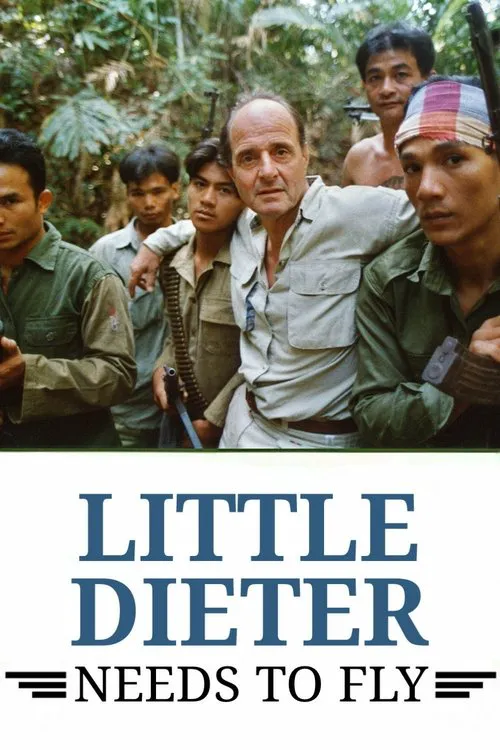Little Dieter Needs to Fly

Plot
The 1997 documentary film Little Dieter Needs to Fly is a haunting and deeply personal look at the tumultuous experiences of Dieter Dengler, a German-American pilot during the early years of the Vietnam War. With the guidance of director Werner Herzog, Dengler embarks on a poignant journey to revisit the locations where he was held prisoner after being shot down over Laos in 1966. The film takes shape as a confessional, one where Dengler candidly recounts his harrowing captivity. Initially shot down and captured by a group of North Vietnamese and Pathet Lao soldiers, Dengler recounts the grueling conditions and physical abuse he endured. He reveals a raw sense of pain, but one tempered by an unmistakable sense of resilience in his narrative, which Herzog deftly captures on camera. Through Dengler's recollections and personal reflections, Herzog delves into the deeper psychological and human implications of being a prisoner, and how these traumatic experiences ultimately inform the course of Dengler's life. Dengler's interactions with local villagers, whom Herzog engages to participate in certain aspects of the documentary, further reveal the complexities and nuances of their experiences as well. As the story progresses, Dengler and Herzog arrive at a pivotal point in the narrative where Dengler decides to reenact the tortures inflicted upon him at the hands of his captors. This is both a deeply poignant and intensely unsettling aspect of the documentary, which raises uncomfortable questions about the morality of depicting such graphic scenes. Herzog's decision to push his subject to re-enact the atrocities is undoubtedly a bold one, and one that yields profound insights into the depths of the human psyche. However, this aspect of the documentary is equally unsettling for viewers, who find themselves confronted by the raw brutality of these events. While the re-enactments are undoubtedly difficult to watch, they remain an essential component of the film's impact, serving to underscore the full weight of Dieter Dengler's harrowing experiences. Throughout the film, Herzog's presence as director is both subtly felt and overtly present. He interjects occasionally, offering insightful questions that prompt Dengler to reflect further on his experiences. Herzog also engages with Dengler on a personal level, probing the long-term repercussions of his captivity and its aftermath. Their unlikely partnership is pivotal to unlocking the complexities of the human experience portrayed in the film. Through Dengler's candid account and Herzog's thoughtful probing, we are able to gain an intimate glimpse into a deeply personal world that is both heartbreaking and deeply moving. The film is a testament to the resilience of human spirit and the enduring capacity of the human psyche to heal from the trauma inflicted by others. Ultimately, Little Dieter Needs to Fly emerges as a film of piercing insight, deeply affecting, and quietly subversive in its questioning of the viewer. It is an unflinching portrayal of war's brutal realities, and one that reminds us, perhaps more than anything else, of the immense cost in human suffering that these conflicts exact. Yet even as it delves into these dark depths, it manages to evoke, too, a profound sense of hope and humanity that transcends such darkness and ultimately serves to underscore the power and tenacity of the human spirit.
Reviews
Recommendations




